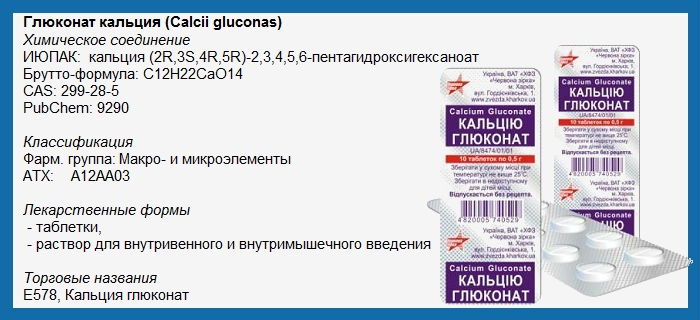Calcium is an important trace element involved in the formation of tissues and enzymes. It is found in bone and connective tissue, improves the process of muscle contraction and nerve transmission. Calcium is involved in the processes of contractile activity of the myocardium, and with its deficiency, cardiac arrest is possible. Also, this trace element has a mild diuretic effect. Calcium reduces the permeability of the vascular wall. When administered parenterally, the drug has a stimulating effect on the nervous system as a whole and brain structures.
Calcium gluconate tablets
1 tablet contains 0.5 g of calcium gluconate. The package contains 10 tablets. Available in regular and chewable tablets.
calcium gluconate injections
10% solution of calcium gluconate for parenteral administration. The content of the active substance in 1 ml of solution is 1 g. The package contains 10 ampoules, with the amount of the drug in 5 or 10 ml.
Storage of the drug
The drug is stored in a place protected from light.
calcium gluconate prices
The average cost of the drug is 35-60 rubles and depends on the region of your residence.
Pharmacokinetics
A third of the drug that enters the intestine is absorbed. The percentage of absorbed calcium directly depends on the presence of vitamin D in the body, the acid balance in the intestinal lumen, and the nature of the food consumed. The trace element is absorbed in large quantities when its limiting concentration in the blood falls below normal. Excretion of the drug is carried out with feces (about 80%) and urine (20%).
Calcium gluconate indications
The drug is prescribed for conditions such as:
- Hypocalcemia of various etiologies;
- Hyperkalemic form of paroxysmal myoplegia;
- Decreased function of the parathyroid glands (manifested as latent tetany, osteoporosis);
- All types of disorders in the metabolism of vitamin D (spasmophilia, osteomalacia);
- Eclampsia;
- Liver damage with various intoxications, the development of parenchymal hepatitis;
- Nephritis, chronic renal failure (hyperphosphatemia);
- In the complex treatment of medicinal and other types of allergies;
- Inflammatory processes, with the phenomena of tissue edema;
- With bleeding of various localization (nasal, uterine, from the digestive tract, pulmonary);
- Increased consumption of calcium ions (pregnancy, accelerated growth, lactation);
- Low calcium content in food;
- Increased excretion of calcium (after prolonged treatment with glucocorticosteroids, diuretics, antiepileptic drugs);
- Violation of calcium metabolism (postmenopausal period);
- In case of poisoning with oxalic acid, fluoric acid, magnesium salts.
Contraindications
It is not recommended to use calcium gluconate in metabolic disorders - hypercalcemia, hypercalciuria. In severe diseases of internal organs, such as kidney failure, increased blood clotting, this drug is also not prescribed. A contraindication to taking Calcium gluconate is its individual intolerance.
Calcium gluconate instructions for use
Calcium gluconate tablets are taken at a dose of 1-3 grams. This amount must be divided into 2-3 doses. It is recommended to take the tablets with milk. Reception should be no later than an hour or 2 before eating.
The solution in ampoules for intravenous and intramuscular use is administered every day, at a dose of 5-10 ml of a 5% solution. The amount of solution and the frequency of administration depends on the severity of the disease.

calcium gluconate during pregnancy
The drug is allowed to be used during the gestational period, according to the recommended doses. Assign 1 or 3 g of calcium gluconate per day. The received dose is divided into 3 doses during the day. The maximum dose that can be administered within one day is 9 g.
calcium gluconate for children
The dose of calcium gluconate is selected depending on the age of the child. The range of a single dose is from 1 to 5 ml of a 10% solution. You can enter every 2 days. Intramuscular administration of the drug to children under 3 years of age is not recommended.
Calcium gluconate application
Doses of the drug in tablets
At the age of 3 to 4 years, 1 g of the drug is prescribed, while the maximum daily dose is not more than 3 g. Children from 5 to 6 years old take calcium gluconate in an amount of 1-1.5 g, but not more than 4.5 d. At the age of 7-9 years, it is recommended to take from 1.5 to 2 g, while the maximum daily dose is 6 g. Children 10-14 years old can take the drug at a dose of 2-3 g, but not more than 9 g. at any age, the daily dosage is divided into 2-3 doses.
calcium gluconate intramuscularly
The solution for intravenous and intramuscular administration is used daily, at a dose of 5-10 ml of a 5% solution. The dose and frequency of administration depends on the severity of the disease.
Adverse reactions
From the circulatory system and heart: bradycardia, heart rhythm disturbance.
From the digestive tract: nausea, vomiting, diarrhea.
special instructions
The drug reduces the effect of tricyclic antidepressants. Calcium gluconate enhances the toxic effect of cardiac glycosides on the myocardium. It also enhances the toxicity of quinidine and can slow down the conduction of electrical impulses through the conduction system of the heart. Colestyramine, when taken simultaneously with calcium gluconate, disrupts its absorption in the intestinal lumen. The drug reduces the antihypertensive effect of verapamil, but does not affect its antiarrhythmic effect.
If the patient has urolithiasis, hypercalciuria, decreased renal clearance, calcium gluconate is prescribed with caution, under the control of laboratory research methods. With urolithiasis, it is necessary to increase the amount of fluid you drink.
Calcium gluconate reviews
Ksenia: the child has a lack of calcium in the body, so I buy him these pills and vitamin C. The cost of the drug is more than budget. Calcium gluconate forms bones, is involved in blood clotting, and these processes are especially important during the recovery period of the body. The tablets were taken one hour before meals 3 times a day. The child said that the tablet tasted like chalk. Of course, before taking it, you need to go to a consultation with a doctor, as there may be side effects.
Darina: I keep it in my medicine cabinet all year round. I take courses, because by nature I have brittle nails. Now the nails do not break, strong beautiful. Several years ago, I had a case of vitamin overdose with potassium and magnesium. The condition was severe, she could not get out of bed. After 4 tablets of Calcium gluconate, all symptoms disappeared. It immediately became easier.
Evgeniya: in the postpartum period, I had signs of a lack of calcium in the body. Immediately, I acquired the well-known drug Calcium D3 Nycomed, although it cost a lot then. Unfortunately, it had no effect. I learned from my friends about the budget drug Calcium Gluconate and decided to try it, anyway, there is nothing to lose. At that time, I was firmly convinced that not expensive drugs do nothing. I took it for about one month, along with vitamin C. After a couple of weeks, the growth of hair and nails increased. I did not even expect such an impact. I recommend it to everyone who has the same problems.
Similar instructions:


